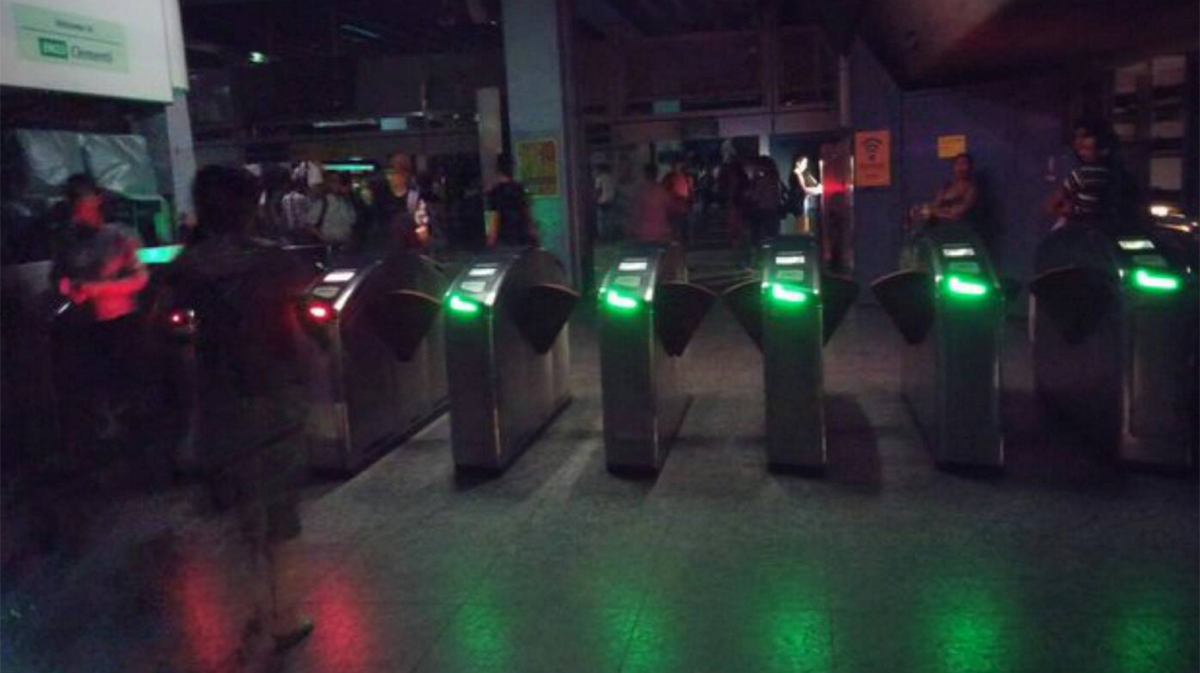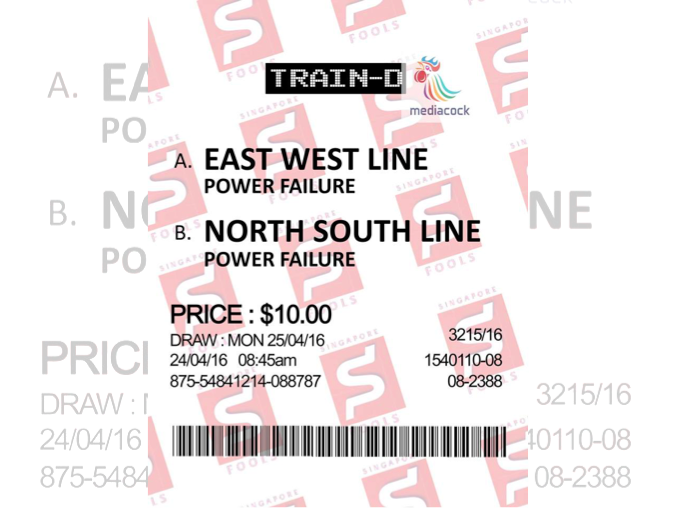So on Monday night, the night where almost all of Singapore's MRT lines collectively decided to go on strike at the same time, a satirical Facebook page called "Mediacock Singapore" came up with the following fantastic meme:
A lottery based on when train delays and disruptions might happen — who knew?
Many were amused, as is expected of memes like this — what else can one do, anyway, in the middle of a darkened train carriage and station, where the only things that were working consistently throughout were these:
 Source: Twitter
Source: Twitter
Little did any of us lesser-educated beings realise, though, the true value of this innocent-looking image. Not until Singaporean economist and public intellectual Donald Low came across it on Tuesday morning:
In case you can't see the Facebook post, here's what Low said:
"This is actually a very good idea. It allows the commuting public to hedge against the risks of train disruptions. Meanwhile, if the regulator makes the train operator pay, it's an incentive-compatible way of getting the operator to reduce disruptions. With the current system of fines, the government never knows if these are set at the right level. With a market such as this to price the cost of a breakdown to the commuting public, this information problem disappears. The more the public is concerned about a breakdown, the more "insurance" it will buy, and the more costly it is to the operator when a breakdown does occur.
The second benefit of such a market is public education. Because of our saliency bias, we are prone to think that MRT disruptions are more frequent than they actually are. We remember the infrequent major breakdowns and ignore the vast majority of days when there are no major incidents. This causes us to overestimate the likelihood of train disruptions. Currently, there is no way for the government or the operators to correct people's misperceptions. Creating a market that allows people to bet on train disruptions is a very good way of correcting people's errors. People who overestimate the likelihood of disruptions will find out very quickly that they are not making money; they will then be forced to adjust their beliefs."
He isn't trolling, by the way — he tells us he is quite serious about what he says.
Now, fret not — in case you don't understand economist-speak, we explain what Low says the benefits of having a train-disruption-linked betting system are:
- Allowing the public to "insure" themselves against the risk of train disruptions — which as we see are happening more and more these days.
- If the betting regulator makes the train operator (i.e. SMRT, in this case, but also potentially SBS Transit) pay out the cash winnings, the companies will be motivated to prevent disruptions from happening. (Also, imagine the epic idea of winning tens of thousands of dollars from SMRT for letting a disruption happen!)
- It also solves the problem of whether the government has been fining transport operators enough for train disruptions — who's to know how many millions are enough to hurt, right? Why not leave it to the public to decide, through the bets they buy?
- It even teaches the public that train disruptions actually aren't as often as they might think — they will learn this detail, which the authorities have tried for ages to explain to us, when they realise their bets aren't reaping rewards as often as they expect... unless they do, that is.
At the rate these past two weeks have been going, people might indeed win disruption bets fairly often.
Anyway, if Singapore really did make "Train-D" a reality, it wouldn't be the first time such a thing was done — similar systems like PredictIt as well as the Iowa Electronic Markets, which hedge bets on political developments in the U.S., have been known to produce findings with great accuracy on the actual outcome of the events, as the bets are based on the "wisdom of crowds".
Hey Singapore Pools, you guys listening? Business opportunity here!
Top image adapted from Mediacock Singapore Facebook page.
If you like what you read, follow us on Facebook and Twitter to get the latest updates.
If you like what you read, follow us on Facebook, Instagram, Twitter and Telegram to get the latest updates.
